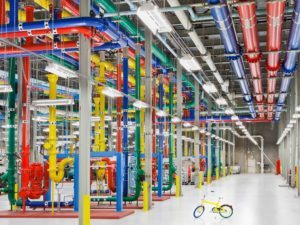Making a Google Search Sustainable

As the world relies more and more on the power of the Internet, Google seeks to power data center operations with renewable resources.
When most users type in a Google search, they don’t consider the energy that is necessary to produce the output of that search. A user can comprehend the electricity necessary to power their individual laptop or mobile device, but for most, comprehension of the infrastructure powering their search stops at the screen. However, behind every Google search, there is a data center, and in order to keep that data center running, energy must be expended. In 2011, Google disclosed that the amount of energy the company uses to power its data centers equates to the amount of electricity needed to power 200,000 homes and that a single Google search expends as much electricity as turning on a 60W lightbulb for 17 seconds (source: “Google Details, and Defends, Its Use of Electricity”, James Glanz, NY Times, 2011). While Google does not release their official energy statistics, in 2015, journalists speculated that Google uses over 1,900 billion kilowatt-hours of electricity to power their data centers, an amount equivalent to the annual electricity needed to power the entire country of Turkey (“The Environmental Toll of a Netflix Binge”, Ingrid Burrington, The Atlantic, 2015). Additionally, one study predicts that a tablet streaming an hour of video per week consumes annually more electricity than two new refrigerators operating in a year (“The Cloud Begins with Coal” Mark P Mills, National Mining Association, 2013).

This reliance on electricity makes tech companies very vulnerable to the fluctuations of utility prices. Google and other major tech firms have reduced their exposure to the variability of commodity prices, like coal, by investing in renewable resources. In many states, Google and other large corporations are mandated by law to purchase energy from local utilities. In order to stabilize and better forecast energy expenditures, Google has bought long-term power purchase agreements (PPA) from renewable sources. The company then sells the renewable energy back into the grid and buys grid energy for its data centers. Over the past 15 years, Google has established 18 contracts across the world that provide 2.5 gigawatts of renewable generation capacity (“New Windfarms to Power Google Data Centers in Europe” Yevgeniy Sverdlik, Data Center Knowledge, 2016). In the situation where local utility companies do not have a monopoly on the electric grid, Google has sought to directly utilize renewable energy. The company strategically chose to build a new data center in Eemshaven, Netherlands in order to capitalize on the stable Dutch energy supplies provided through renewable resources (“Google to Build Data Center in Netherlands” New York Times, 2016). Energy efficiency is also built into the design of all Google data farms. Unlike many data driven companies, Google builds its data centers from scratch, ensuring energy efficiency throughout. Google estimates that its data centers use 50% of the energy that other data centers expend (source: google.com).

Data centers aren’t just power hungry, they are also thirsty. In order to keep the servers cool, data centers require a substantial amount of water. Google has experimented with data center designs that reduce the level of water consumption. Google data centers are strategically located so that they can capitalize on physical aspects of the local environment. Each data center is designed a little bit differently so that the company can capitalize on natural cooling and reduce mechanical cooling. In Finland, Google uses the outside sea water and heat transfer to provide electronic cooling. In Oregon, Google has established partnerships with local water and sewer authorities, so that they can reuse and purify gray water to be used in data center cooling. To further promote water management, Google has started investing in rainwater harvesting technology (source: google.com/green/efficiency).

While Google has made strides towards creating sustainable data centers. Monopoly utilities continue to create a barrier for the company. Google data centers in Georgia, North Carolina, and South Carolina, and overseas in Taiwan and Singapore do not run on renewable energy sources (“2015 Clicking Clean Report” Green Peace, 2016). Google creates enough energy that they have leverage. The company should invest more in policy to expand renewable energy options in these monopoly entrenched environments. Additionally, Google should consider investing in their own renewable generation capacity. This will increase pressure on the utility companies and potentially pave the way for smaller companies to have access to renewable resources. Investing in renewable resources is a luxury that most organizations with data centers cannot afford. While Facebook, Apple, or Google can strong arm the local utility companies into providing renewable power, a small company does not have enough leverage. If Google is truly committed to creating a more energy efficient online, then the corporation needs to take on a stronger advocacy role and improve access to renewable resources both for their own data centers and also for those of smaller organizations.
Word count: 794



Its incredible to shift perspective and consider the energy needed to power our day-to-day Google searches! Given the significant need to cool servers and Google’s willingness to experiment with design and location, I wonder if it would be worth exploring hydropower as a potential energy source as well as a cooling mechanism. It would also be interesting to see if Google could expand even further into the renewable energy field by bringing the capability of energy production in-house via higher utilization of wind and solar farm investments, and if it can leverage this skillset to set a precedent for technology companies across its competitive landscape.
What a great insight into the world of Google. I agree they should invest more in policy to expand renewable energy options. As I was reading the article, I couldn’t help but wonder if Google could also invest in innovating new ways of either creating or reducing renewable energy consumption, either on its own or by funding research through service providers.
Very interesting article on Google’s dependence on energy and water to operate their data centers. I wonder whether there are additional methods to reduce the amount of water required to sufficiently cool servers and/or take advantage of the heat that is generated? For example, many industrial manufacturing companies reuse heat generated in their processes, convert to steam, and use a source of energy for turbine powered equipment. Perhaps Google could also harness the heat that the servers produce and reuse the energy for other purposes.
Great article…I never thought about how something as simple as a Google search can use up so much energy. It definitely makes me think twice before playing Netflix in the background. Often when we think about climate change in a business context, our mindset automatically shifts towards established industries that have a history of pollution. However, you bring up a great point on how technological advancement probably has an even bigger potential to harm the earth as everything we do these days require a tremendous amount of energy. Google certainly has the power to exert its influence on utilities, but do the utility companies have a similar incentive to move towards alternative energy sources (especially in an environment without any government subsidies or credits)?
Very insightful article. As I pause a second, to reflect on what I have just read, I do however reckon that this is not just about data centers.
Google is certainly using renewable energy to its advantage and to address the issues you accurately outlined; but when I read about their other projects around the globe – for instance testing solar-powered drones to beam 5G Internet in poorly covered countries – I see this as a potential game changer for the industry as a whole.
Google and the likes stand to gain from being available to and used by everybody, hence their new mastery in renewable energy could be leveraged to address emerging countries with poor internet and/or technological access.
Really enlightening post – thank you for sharing. I was quite surprised to learn that Google searches use that much energy. While it feels negligible when you think about one or two searches, this is one of those cases in which tiny amounts can add up to a lot!
Out of curiosity, I took a look at their webpage on sustainability, entitled Google Green. While they mention many of the same initiatives you do, it was somewhat surprising to me that they assert on multiple occasions that their environmental impact is nowhere as large as some speculate. For example, journalists in 2015 believed Google’s data centers were using power equivalent to that used by the country of Turkey. However, on their website, it states their data centers use less than 0.01% of the world’s electricity. I’d be curious as to the discrepancy and whether they are trying to mask their baseline starting point, even though it would allow them to cite that much more improvement.
Another interesting thought is that Google is leveraging its new “moonshots” division to dabble and innovate in a whole host of unique projects – renewable energy, emission reduction, and other climate change combating ideas could be great seedlings for future successful moonshots!
Thank you for sharing great insights Ellyn – never thought about the link between tech company like Google and sustainability. One thing struck me in your article is the amount of electricity you consume when streaming a video. In next few decades, we will see an exponential increase of internet usage and this will lead to further electric consumption both for consumers and service providers. Maybe Google can also play a proactive role on how to make the data usage more efficient, e.g., finding a way to stream a video with much less electricity?
“A single Google search expends as much electricity as turning on a 60W lightbulb for 17 second.” This statistic is going to haunt me in my sleep–considering how much I have to Google to figure out what all of the TOM and FIN1 lingo means, I hate to think of how my naivety is harming the environment :P.
In seriousness, this is a very cool topic. I was unaware at how the utility company monopolies can serve as such a hindrance to sustainability, and think you’ve uncovered an interesting (yet frustrating) point that very few organizations are powerful enough to assert any sort of leverage against the utility monopolies to encourage partnership with industry to establishing more sustainable practice. With such a high-profile–and generally well-regarded–company, I wonder if there are ways for Google to build grassroots support for (or at least promote awareness of) the need to disrupt the practices of utility monopolies to ensure a sustainable future.
Extremely insightful article! Given proliferation of smart phones and “on the go” access in emerging and developed economies this issue might become much larger in the near future. Would love to see projections (if any) that combine this information with the exponential rise in connected devices in emerging countries to come up with the additional energy burden these devices will create.
Fascinating article! I always assumed computers/”soft copies” of documents were less environmentally friendly than everyone seemed to believe, but the scale of energy and resource usage is staggering. While I find the various efforts Google is taking to ensure more and more of its energy usage in coming from renewable resources, I am also curious to understand how Google views the energy needs from its “process”, and whether there are additional ways for the company to improve how searches are executed to continue to reduce energy requirements. While your post did mention some aspects of physical design of data centers and their effects on energy consumption/needs, I am also curious about this problem from a computational/electrical perspective. First, how are improvements in computational power effecting energy usage to carry out tasks? Second, are there effects of scale at play here? Would larger or smaller data centers effect the energy needs? What would the trade-offs be to changing the size or location of data centers? Are we talking about milliseconds of speed or more visible changes in quality of service? Perhaps consumers are willing to trade off some of the benefits that would need to be sacrificed in order to achieve more computational energy efficiency.
It was easy to search to find some interesting tech related sustainability posts but difficult to one – thanks for sharing. As Jared mentioned, I was always considering tech companies less environmental friendly due to hyper consumption of technology by millennials such as replacing a phone every 6 months without any necessity. Although, i admire all tech companies because of their contributions to life changing innovations, I am getting surprised every time how they are lagging behind in sustainable innovations. Finally, it is great to see some serious efforts by tech giants. As you mentioned in the post, monopolies in tech industry diminishes the potential opportunities. However, less competitive industry means higher margins and higher power to invest on sustainability. I believe big tech companies have no excuse not to entirely change their business models to be eco-friendly. They owe to millennials as millennials owe to them. All stakeholders in the ecosystem should incentivize each other more aggressively to create disruptive sustainable business models.
This is a great article! I had never considered the energy implications of something so seemingly simple as a Google search. Looking beyond Google, with the advent of cloud computing, the number of servers will continue to grow and place a heavier burden on energy demand. It would be interesting to explore if there could be any uses for the heat produced by the server stacks since it is currently expended as waste when cooled by gray water.